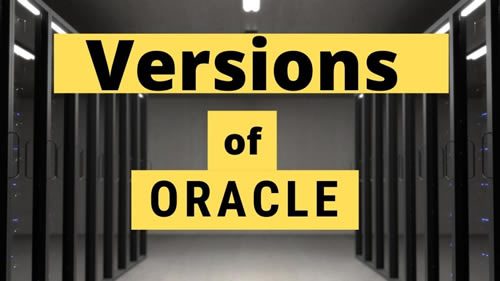Table of Contents
Introduction:
Oracle is a Relational Database Management System (RDBMS) available in various versions.
In this article I am going to tell you various Oracle versions and features.
Oracle RDBMS is providing all the features to perform online transaction processing and data where housing.
Every new oracle version comes with new features. Any software is not a final product. There is always a scope for improvements. That’s why there is a need to understand the Oracle versions and features of these versions.

What is Database?
Database is a collection of tables.Table is a collection of records(Rows), and record is a collection of logically related fields(columns).
What is Relational Database ?
All modern database management systems like SQL, MS SQL Server, IBM DB2, ORACLE, My-SQL and Microsoft Access are based on RDBMS.
However, now a days Big data is in demand because of its capability of handling unstruc
The basic working of Relational database is based on Relational model.This model is providing various facilities such as
- Representing data base table as a relation
- you can relate database tables by the concept of primary key and foreign key.
- RELATIONAL DATABASE MODEL is providing facilities to perform several types of join operations.
- RELATIONAL DATABASE MODEL is based on Codd Rules
What is Version?
Software companies are using different version numbers to launch the same software with new features.
Each version of software shows a unique set of features. newer version is a super set of old version.
Types of version numbers
- Software companies are using Major version number to show major changes in software.
- Software companies are using Minor version number to show the minor changes in software.
Oracle versions and features
- Oracle 8 offers better recovery management and partitioning facility along with all the features of relational data base management system.
- In Oracle 8i, i stands for internet. Oracle 8i is providing support for on line transaction processing.
- Oracle9i Database is providing Oracle Real Application Clusters (RAC), and Oracle XML DB
- In Oracle Database 10g(g stands for grid computing) Release 1 is providing Automated Database Management, Automatic
- Database Diagnostic Monitor, Grid infrastructure, Oracle ASM, and Flashback Database.
- Oracle Database 10g Release 2 is providing Real Application Testing, Database Vault, Online Indexing, Advanced Compression,
- Data Guard Fast-Start Failover, Transparent Data Encryption.
- Oracle Database 11g Release 1 is providing Active Data Guard, and Secure Files.
- 11g Release 2 is providing Edition Based Redefinition, Data Redaction, Hybrid Columnar Compression, Cluster File System, Golden Gate Replication, Database Appliance
- 12c(c stands for cloud) Release 1 is providing Multitenant architecture, In-Memory Column Store, Native JSON, SQL Pattern Matching, Database Cloud Service.
- 12c Release 2 is providing Native Sharding, Zero Data Loss Recovery Appliance, Exadata Cloud Service, Cloud at Customer.
- 18c is providing Polymorphic Table Functions, Active Directory Integration.
Difference between Oracle 11g and Oracle 12 c
| Oracle 11G | Oracle 12C |
| Indexing: Oracle 11 G is providing facility to create only one index on one column | Indexing: Oracle 12 c is providing facility to create more than one index on same column. However only one type of index on column is usable at a same time. . |
| In Memory table : Oracle 11 g is providing a concept of In-memory table which is helpful for the improvement of full table scan The user needs to put the table in the memory so that user can access the fast data. Oracle 11 G is supporting concept of memory aggregation . | In Memory aggregation : Oracle 12C supports the In memory aggregation concept which is very useful in star queries. |
| Table partition and subpartition movement : To move the partition and subpartition from one tablespace to other tablespace user needs to write complex procedural logic. | Table partition and subpartition movement : To migrate the table partition and subpartition oracle 12c uses 2 methods one is with online keyword and second is offline method. |
Conclusion
Oracle is providing many versions with different features. These versions are meeting out the requirements of all type of organizations ( small, medium, and large).
You should select Oracle version as per your need for example if you are considering for cloud computing , Oracle 12 c is a good choice because 12 c is offering features by which your database can work cloud technologies.
Read the more interesting article: click here
Read the more interesting article: Database Developer Skills and Salary
if you have any questions regarding database management system then comment your questions
Thank you
